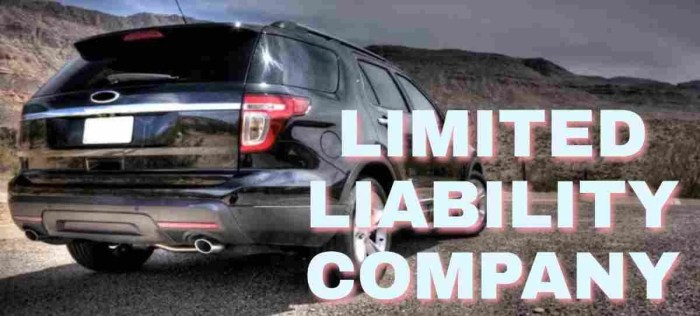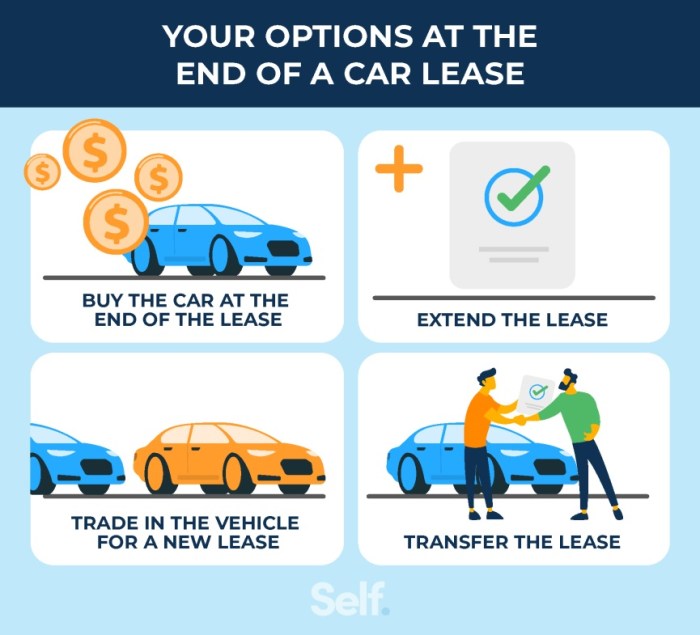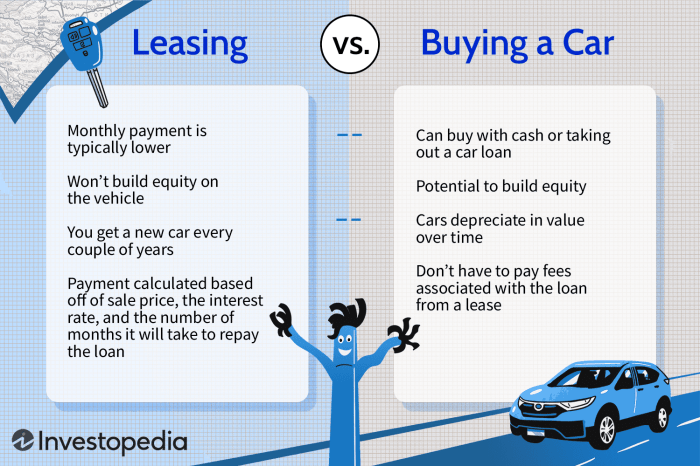How to Get Out of a Car Lease dives into the intricacies of ending a car lease, offering valuable insights and practical tips for navigating this process smoothly.
From understanding the terminology to exploring the various exit options, this guide equips you with the knowledge needed to make informed decisions about terminating your car lease.
Understanding Car Lease Terminology

A car lease is a contract between a lessee (the person leasing the car) and a lessor (the company providing the car) that allows the lessee to use the car for a specified period in exchange for monthly payments.
Lease Term: The lease term is the duration of the lease agreement, typically ranging from 24 to 48 months. It specifies how long the lessee will have possession of the vehicle.
Monthly Payments: These are the regular payments made by the lessee to the lessor for the use of the car. The amount is determined based on factors such as the car’s value, lease term, and interest rates.
Residual Value: The residual value is the estimated value of the car at the end of the lease term. It plays a crucial role in determining monthly payments and is used to calculate potential fees for terminating the lease early.
Implications of Terminating a Lease Early vs. at the End of the Term
- Early Lease Termination:
- Penalties: Terminating a lease early often incurs penalties, such as early termination fees and remaining lease payments.
- Impact on Credit: It can negatively affect the lessee’s credit score, making it harder to secure future financing.
- Residual Value: Ending the lease early means missing out on potential savings from the difference between the car’s residual value and market value.
- End of Lease Term:
- Options: At the end of the lease, the lessee can choose to return the car, buy it at the residual value, or lease a new vehicle.
- Mileage and Wear Fees: Additional charges may apply if the lessee exceeds the mileage limit or returns the car with excessive wear and tear.
- Flexibility: The end of the lease term offers more flexibility in exploring different car options or financing choices.
Reasons for Wanting to Get Out of a Car Lease

There are several common reasons why someone might want to exit a car lease before its scheduled end date. Let’s explore some of these reasons and the financial considerations involved.
Job Relocation
One of the common reasons for wanting to get out of a car lease is job relocation. If you have to move to a new city or country for work, it may not be feasible to take the leased car with you. In such cases, terminating the lease early might be necessary.
Financial Hardship
Unexpected financial difficulties can also lead to the desire to get out of a car lease. If you’re facing a loss of income or other financial challenges, continuing with the lease payments may become burdensome. In such situations, it’s important to consider the financial implications of early termination.
Change in Transportation Needs
Your transportation needs may change over time, making the current leased vehicle no longer suitable. For example, if your family size has increased or you now require a different type of vehicle for your daily commute, you may consider terminating the lease early to get a more suitable car.
Better Lease Deals, How to Get Out of a Car Lease
Sometimes, better lease deals or promotions become available after you’ve already signed a lease agreement. If you find a more attractive offer elsewhere, you may want to exit your current lease to take advantage of the new opportunity. However, it’s important to carefully evaluate the costs and benefits before making a decision.
Options for Exiting a Car Lease
When it comes to getting out of a car lease, there are several options available to consider. Each method has its own set of pros and cons, so it’s essential to understand them before making a decision.
Lease Assumption
Lease assumption involves transferring your lease to another individual who takes over the remaining lease term and payments. This option can be beneficial if you find someone willing to assume the lease, relieving you of the financial responsibility.
- Pros:
– You can avoid early termination fees.
– It allows you to exit the lease without damaging your credit.
- Cons:
– You may still be held responsible if the new lessee defaults on payments.
– Not all leasing companies allow lease assumption.
Lease Buyout
Lease buyout involves purchasing the vehicle outright from the leasing company before the end of the lease term. This option gives you ownership of the car, allowing you to sell it or keep it as you wish.
- Pros:
– You have control over the vehicle’s future.
– You can avoid excess mileage or wear-and-tear charges.
- Cons:
– It may require a significant amount of money upfront.
– You may end up paying more than the car’s current market value.
Lease Transfer
Lease transfer involves finding someone to take over the remainder of your lease agreement. This option can be appealing if you no longer need the vehicle but want to avoid termination fees.
- Pros:
– You can get out of the lease without financial penalties.
– It can help you avoid credit damage from early termination.
- Cons:
– Finding a qualified individual to take over the lease can be challenging.
– Some leasing companies may charge transfer fees.
Steps to Take to Get Out of a Car Lease: How To Get Out Of A Car Lease
When you have made the decision to terminate your car lease, there are specific steps you need to follow to ensure a smooth exit process. It is essential to understand the process thoroughly and review your lease agreement to avoid any potential issues.
Evaluate Early Termination Fees
Before initiating the lease termination process, review your lease agreement to understand any early termination fees that may apply. These fees can vary depending on how much time is left on the lease and the leasing company’s terms.
- Check your lease agreement for details on early termination fees.
- Calculate the potential costs involved in terminating the lease early.
- Consider whether the fees outweigh the benefits of exiting the lease.
Contact the Leasing Company
Reach out to the leasing company to inform them of your decision to terminate the lease. They will provide you with specific instructions on how to proceed and may require you to submit a formal request in writing.
- Call the leasing company’s customer service department to notify them of your intent.
- Request information on the necessary steps to initiate the lease termination process.
- Follow any instructions provided by the leasing company to move forward.
Return the Vehicle
Arrange a time to return the leased vehicle to the leasing company once you have received instructions on the lease termination process. Make sure to clean out the car and remove any personal belongings before returning it.
- Schedule a drop-off time with the leasing company’s designated location.
- Perform a final inspection of the vehicle to document its condition.
- Obtain a receipt or confirmation of the returned vehicle for your records.
Financial Implications of Exiting a Car Lease

When considering getting out of a car lease early, it is crucial to understand the financial implications involved. Terminating a lease before the agreed-upon term can result in various costs and penalties that can impact your finances significantly.
Potential Fees and Penalties
- Early Termination Fee: Most lease agreements have a clause that specifies an early termination fee if you end the lease before the contract term is up. This fee can be substantial and needs to be considered before making a decision.
- Remaining Lease Payments: You will likely be responsible for paying the remaining lease payments if you terminate the lease early. This can add up to a considerable amount depending on how many months are left on the lease.
- Excess Mileage Charges: If you have exceeded the mileage limit specified in your lease agreement, you may face additional charges when returning the vehicle.
- Disposition Fee: Some leasing companies charge a disposition fee when you return the vehicle at the end of the lease term. This fee may still apply if you end the lease early.
Tips to Minimize Financial Losses
- Consider Transferring the Lease: One way to avoid most of the financial penalties of ending a lease early is to transfer the lease to another party. This can help you offload the lease responsibly and avoid many of the fees associated with early termination.
- Negotiate with the Leasing Company: In some cases, you may be able to negotiate with the leasing company to reduce the early termination fees or come up with a payment plan that is more manageable for you.
- Explore Buyout Options: Depending on your lease agreement, you may have the option to buy out the vehicle at a predetermined price. This can be a way to end the lease early without incurring excessive fees.
Legal Considerations When Exiting a Car Lease

When it comes to getting out of a car lease, there are important legal considerations to keep in mind to ensure a smooth termination process. Understanding the rights and obligations of both parties involved, the lessee and the lessor, is crucial in avoiding any legal risks or implications.
Rights and Obligations
- Both the lessee and the lessor have specific rights and obligations Artikeld in the lease agreement.
- The lessee typically has the right to terminate the lease early, but this may come with certain penalties or fees.
- The lessor is obligated to follow the termination process as Artikeld in the lease agreement and cannot change the terms without consent.
- It is important to review the lease agreement carefully to understand each party’s rights and responsibilities.
Legal Risks and Implications
- Exiting a car lease without following the proper procedures Artikeld in the agreement can lead to legal consequences.
- Failure to pay any outstanding fees or penalties associated with early termination can result in legal action from the lessor.
- Violating the terms of the lease agreement can damage your credit score and may impact your ability to lease or finance a vehicle in the future.
- Consulting with a legal professional or seeking advice from the lessor can help you navigate any potential legal risks involved in terminating a car lease.
Closure

Conclusively, How to Get Out of a Car Lease sheds light on the complexities of exiting a car lease and empowers you to take the necessary steps with confidence.